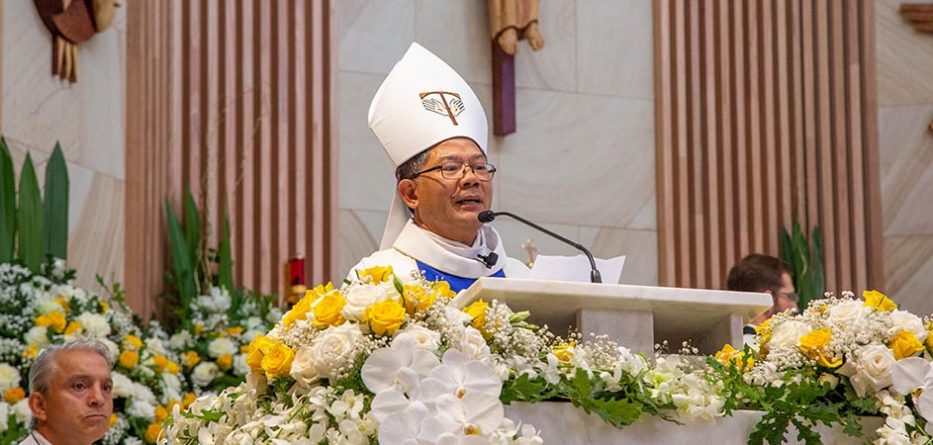Most Reverend Vincent Long Van Nguyen OFM Conv DD STL, Bishop of Parramatta
Homily for the 2nd Sunday in Ordinary Time Year A 2020 at Vigil Mass at the Parish of Baulkham Hills, Baulkham Hills
Readings: Isaiah 49:3,5-6; 1Cor 1-3; Gospel Jn 1:29-34
18 January 2020
Turning crisis into a new horizon of possibility
Dear brothers and sisters,
After months of severe drought and devastating bushfires, we have been finally blessed with rain, gentle, soaking and glorious rain, particularly here in NSW. There were scenes of joy and delight filmed and shared on social networks. While it is right that we celebrate the much-needed rain, it would be unwise for us to miss the opportunity presented to us by the environmental crisis. We cannot afford to go back to business as usual in the light of the long-term impact of adverse climate change and the crying need for a sustainable future.
The Word of God today also speaks to us about crisis and opportunity. It calls us to discern the divine purpose in the midst of our lived stories. It reminds us that God’s story is always bigger than ours and that we should hold our stories within God’s life and weave them into the wide-open future.
In the first reading, we have one of the great passages in Isaiah. God’s people face a monumental crisis. They were defeated, their land taken, their temple destroyed and Babylon became the new Egypt. It was an exodus in reverse. Into this crisis of faith and identity, Isaiah instils new vision of hope and purpose. He speaks of the faithful exiles as the servant Israel who will act as God’s agent. Israel’s new mission is to gather the survivors of the exile and to be the light of the nations. This is an extraordinary prophecy that breaks down tribal barrier and summons the exiles to the task of restoring the whole creation as God intends.
Hence, the long arc of God’s story points towards not just Israel’s restoration but the restoration of all things according to the divine design. Isaiah summons them to a new future after the exile. This new future does not simply consist in the regaining of former status in Palestine. It is not going to be a return to the past glories. It is not “Make Israel Great Again”. Rather it will be a humble remnant people learning to be a beacon of light and a sign of God’s presence in the world. The new Jerusalem after the exile will be rebuilt not with gold, power and smug arrogance but with integrity, justice, peace and communion with all.
Paul understands God’s purpose for his people in a different historical context. Like Isaiah, who calls the exiles to their mission beyond their tribal identity and ancestral land, Paul issues a similar challenge to the Corinthian community made up predominantly of converts from the pagan world. In Corinth, renowned among other things for its immorality, the followers of Christ are to fulfil Israel’s ancient destiny to be a “light for the nations”.
Both Isaiah’s prophecy concerning the mission of Israel and Paul’s exhortation to the Corinthians help us to appreciate the messianic role of Jesus. He is the servant in whom Yahweh is glorified. He is the one who comes to to God’s will. John’s Gospel would pick up these Old Testament references by having Jesus declare in anticipation of his passion: “I have glorified you on earth by accomplishing the work you gave me to do”. This work is to heal, to forgive, to restore and to make whole. It is to give life in its fullness to all. In essence, the work of Jesus is encapsulated by his death on the cross. Hence, for John the Evangelist, Jesus is the lamb of God, the paschal symbol par excellence, who would bring divine purpose to fulfilment in radically self-effacing way.
Brothers and sisters,
Scriptures today encourage us to discern God’s will in crisis and to boldly walk into the future God calls us into. Thus, the critical moments of our lives, individually and collectively can be new horizons of possibility, for us but also beyond us, to future generations and to the world that God loves.
In the light of the ecological crisis that demands a conversion of heart and a change of lifestyle, we must have the courage to align ourselves with God’s plan for the world. The bushfire crisis should serve as a wake-up call to Australia and all Australians. It should also serve as a catalyst for global action in the way that Pope Francis has so prophetically challenged us in his encyclical Laudato Si. We must have the courage to move to the new future where God beckons. The time has come for Christians to show the alternative pathway of hope, justice and sustainability against the ingrained culture of denial, fear and defence of the status quo.
Let us pray in thanksgiving for the blessing of God’s refreshing rain. But let us pray even more for a deep discernment and courageous action in response to the signs of the times and God’s plan for us moving forward. Just as the Israelites of old, we must neither yearn for the past nor despair for the future. May our disorientation turn into a new orientation that God has in store for us.
May we faithful servants learn to be the light of the nations by our witness to the Gospel.








